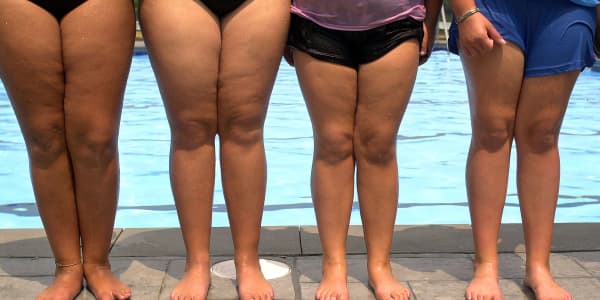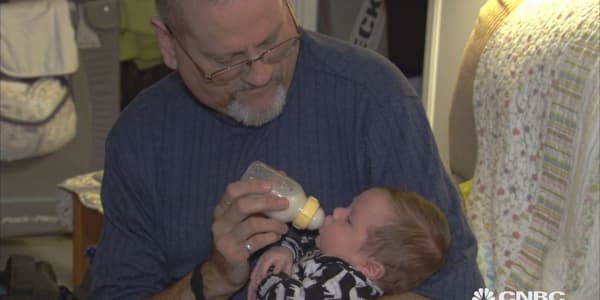A new year means it's time to comply with new resolutions for many people. Most often, that means targeting health and wellness. A Google search analysis conducted last January showed that getting healthy was the most popular resolution, with more than 62 million searches, almost double the second-most-searched New Year's resolution: getting organized.
The ubiquity of smartphones in daily life makes it easier than ever to make a resolution related to health — sticking to it is something else. App tracker App Annie provided CNBC with data on the most popular free versions of health and wellness apps from 2017 based on both the Apple and Android app-store downloads. The data was through Dec. 28, 2017.
As technology giants such as Apple, Amazon and Google get serious about remaking the health-care sector, these results show how Americans are using their phones to take more control of their health, and the specific health issues that are proving to be most app-friendly.
Fitbit is still No. 1, even if its stock price doesn't show it
Fitbit's stock may be a dog — down roughly 20 percent in 2017 and now valued at about one-fifth of its post-IPO trading debut in 2015 — but the fitness-tracking device's app remains No. 1 in the health category among free downloads. And it's collected a lot of data — by its own count, 90 billion hours of heart-rate data, 85 trillion steps, 5.4 billion nights of sleep and 167 billion minutes of exercise. In its most recent results for the third quarter 2017, Fitbit reported sales of 3.6 million devices. While that level of device sales explains why it remains No. 1 on both Apple and Android app stores, its sales numbers have trended down in recent years, which explains the stock price.
While the amount of data that can be collected is impressive — and will help medical researchers, including at the National Institutes of Health — a few prominent early studies investigating how much fitness trackers improve the health of users haven't provided glowing results.
Fitbit's latest product, the Ionic smartwatch that doubles as fitness tracker, faces the daunting task of beating out the Apple Watch. Amazon has been running a discount on the FitBit Ionic this week, timed to new health resolutions.
My Fitness Pal
Under Armour's My Fitness Pal — which the sports apparel company bought in 2015 for $475 million — is No. 2 among free apps and UA touts a registered user base of 225 million-plus for this app plus others in its fitness app ecosystem, such as MapMyRun. The app allows users to count their calories for free. It includes more than 5 million foods in its database, considered the app world's largest, to help just about anyone track just about anything that they are eating, in calories. Users can complete other tasks related to weight loss, such as keeping a dieting journal and compiling healthy recipes.
Calm
Being named "App of the Year" by Apple helped this meditation and mindfulness app created by British tech entrepreneurs Michael Acton-Smith and Alex Tew reach No. 3 among free downloads. It was downloaded at a rate of up to 30,000 per day in 2017. The Calm app includes a Sleep Stories function, which offers users the opportunity to nod off to the voice of actor Stephen Fry. Acton Smith was previously known for the tech firm Mind Candy and the gaming success Moshi Monsters, which at one point half of all British children were playing, though that business has struggled more recently.
Calm's success — investors thought it was "weird," according to Acton Smith when it debuted in 2012 — comes amid a boom in meditation and sleep practices at companies including Salesforce and Arianna Huffington's Thrive Global, as Silicon Valley and corporate America now see these lifestyle choices as keys to productivity. Walmart's Jet online shopping business launched a Wellness Shop this week.
While the Calm app is free, the company offers a premium subscription, and the app also is affiliated with other products, including a Calm book and Calm Sleep Mist.
Flo Period and Ovulation Tracker
The promise of artificial intelligence includes looking at many existing health-care issues in new ways. This app makes predictions of menstruation and ovulation using machine learning. The app is more than just a monthly countdown tool, though. It can be used for contraceptives and other pill planning; to track cycles and symptoms over time; integrate menstruation with lifestyle — sleep, hydration and exercise; and of course, help women trying to conceive.
Flo Period may be among the most popular, at No. 4 in 2017, but it's far from the only app in this niche — the paid version of competing app Period Tracker is among the five most popular paid health downloads, according to App Annie. And there are also devices on the market specifically designed to work with apps for uses including fertility. The fertility business overall has boomed and is now valued in the billions of dollars and growing.
Headspace
Playing in the same niche as Calm, Headspace offers guided meditation sessions and mindfulness training. Its co-founder, Andy Puddicombe (pictured here leading a meditation class), has become a minor meditation celebrity: He is the author of multiple books under the Headspace brand, a Ted talker and even led the Tonight Show's band The Roots through a two-minute meditation on-air in 2017. But his flair isn't as surprising when his degree in Circus Arts from the Conservatoire of Dance and Drama in London is considered. His pre-Headspace bio also included traveling to the Himalayas to study meditation after dropping out of school and 10 years later being ordained as a Tibetan Buddhist monk.
At No. 5 among all free downloads in the health niche, Headspace has also had success in the corporate arena. Companies that Headspace touts as users of its tool for productivity include Google, Airbnb, Spotify, LinkedIn, Aetna, Unilever and — in an industry that probably needs stress relief measures more than many — United Airlines.





